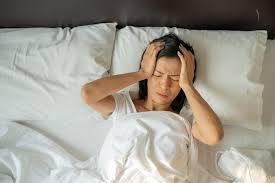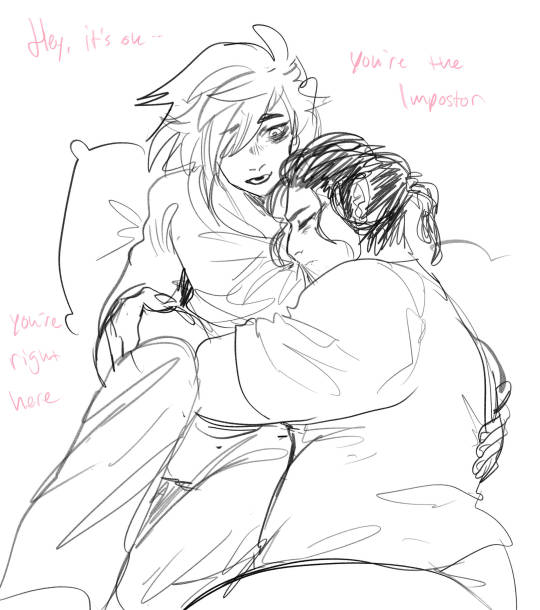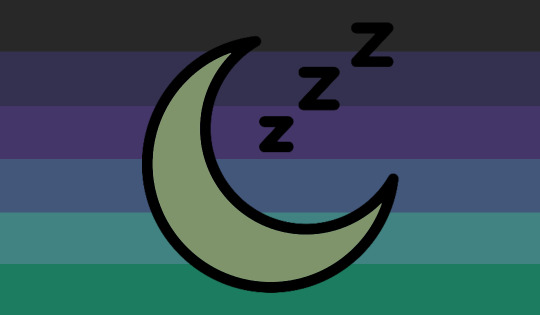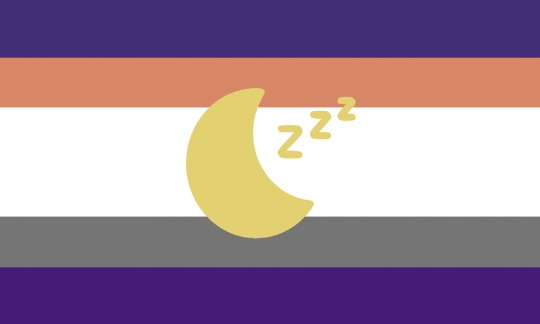#insomnia disorder
Text
"Di malam yang masih bergelap, pikiran berkeliaran tanpa arah. Bayang-bayang masa lalu menghantuiku, dan dalam sunyi yang merayap, kehampaan merasuk dalam setiap nafas. Tersesat di lorong-lorong pikiran, aku mencoba menemukan titik terang di tengah gelapnya kehampaan."
Mengapa tiba-tiba teringat masa lalu???
02.07. A.M. ((rindu diriku yang dulu)).
1 note
·
View note
Text
Insomnia Disorder: Symptoms and Management Strategies

Insomnia disorder is a common sleep disorder that significantly affects individuals' quality of life. It is characterized by persistent difficulty falling asleep, staying asleep, or achieving restorative sleep. This article explores the symptoms of insomnia and provides effective management strategies to help those suffering from this condition.
Understanding Insomnia Disorder
Insomnia disorder is more than just an occasional restless night. It involves chronic patterns of disrupted sleep that can have serious consequences for physical health, mental well-being, and daily functioning. Typically, we classify the condition into two categories: acute and chronic.
Acute vs. chronic insomnia
Acute Insomnia: This is short-term insomnia that can last from a few days to a few weeks, often triggered by stress, traumatic events, or sudden changes in lifestyle or environment.
Chronic insomnia is defined as occurring at least three times per week for three months or longer. This long-term condition often requires comprehensive treatment approaches.
Symptoms of Insomnia Disorder
Identifying the symptoms of insomnia is the first step toward managing it effectively. Symptoms can vary in severity and impact, but typically include the following:
Difficulty falling asleep
One of the most common symptoms is trouble initiating sleep. Individuals may lie awake for extended periods, unable to relax or quiet their minds enough to fall asleep.
Frequent Awakenings
Many people with insomnia experience multiple awakenings throughout the night. This disrupts the sleep cycle and prevents deep, restorative sleep.
Early morning wake-ups
Waking up too early and being unable to return to sleep is another hallmark symptom. This often results in insufficient total sleep duration and feelings of unrefreshing sleep.
Daytime Sleepiness and Fatigue
Persistent fatigue and daytime sleepiness are common symptoms of insomnia. Individuals may struggle with concentration, memory, and maintaining alertness during daily activities.
Mood Disturbances
Chronic insomnia is often associated with mood disorders such as anxiety and depression. The lack of quality sleep can exacerbate these conditions, creating a cycle of worsening sleep and mood problems.
Reduced Performance
Insomnia can lead to decreased performance at work or school, impairing the ability to complete tasks effectively and efficiently. This can further contribute to stress and anxiety.
Management Strategies for Insomnia Disorder
Managing insomnia requires a comprehensive approach that addresses the underlying causes and promotes healthy sleep habits. Here are some effective management strategies:
Cognitive-Behavioral Therapy for Insomnia (CBT-I)
Research has demonstrated the high effectiveness of CBT-I as the first-line treatment for chronic insomnia. It involves several components aimed at changing sleep-related thoughts and behaviors:
Stimulus Control: This technique involves creating a strong association between the bed and sleep by using the bed only for sleep and sex and establishing a regular sleep-wake schedule.
Sleep Restriction: You can increase sleep efficiency by limiting the amount of time you spend in bed to the actual amount of sleep you achieve. Over time, this can help reset the body’s sleep patterns.
Cognitive Therapy: This component addresses negative thoughts and misconceptions about sleep that can contribute to insomnia. Individuals can reduce sleep-related anxiety by challenging and changing their thoughts.
Relaxation Techniques: Methods such as progressive muscle relaxation, deep breathing exercises, and mindfulness meditation can help reduce pre-sleep arousal and promote relaxation.
Lifestyle Modifications
Adopting healthy lifestyle habits is crucial to managing insomnia. Key lifestyle changes include:
Sleep Hygiene: Practicing good sleep hygiene involves creating a conducive sleep environment, maintaining a regular sleep schedule, and avoiding stimulants like caffeine and nicotine close to bedtime.
Regular Exercise: Engaging in regular physical activity can help regulate sleep patterns. However, it's important to avoid vigorous exercise close to bedtime, as it can have the opposite effect.
Balanced Diet: Eating a healthy, balanced diet and avoiding heavy meals before bedtime can improve sleep quality. Foods rich in tryptophan, such as dairy and turkey, can promote sleep.
Medications
In some cases, medication may be necessary to manage insomnia, particularly if behavioral interventions are not sufficient. Options include:
Prescription Medications: Doctors can prescribe benzodiazepines, non-benzodiazepine sleep aids, and certain antidepressants for short-term use. We do not recommend long-term use of these medications due to potential side effects and dependency risks, although they can aid in sleep initiation and maintenance.
Over-the-Counter Aids: Melatonin supplements and antihistamines are available without a prescription. While melatonin can help with sleep onset, it is not effective for long-term insomnia management.
Alternative Therapies
Some individuals find relief through alternative therapies, though their effectiveness may vary.
Herbal Supplements: Although there is little scientific evidence to support their effectiveness, people have used natural remedies like valerian root, chamomile, and lavender to promote relaxation and sleep.
Acupuncture and Yoga: Practices like acupuncture and yoga can help reduce stress and promote relaxation, potentially improving sleep quality.
Conclusion
Insomnia disorder is a complex condition that requires a multifaceted approach for effective management. By understanding the symptoms and employing a combination of cognitive-behavioral therapy, lifestyle modifications, medication, and alternative therapies, individuals can significantly improve their sleep quality and overall well-being. Anyone experiencing persistent sleep issues should seek professional guidance to develop a tailored treatment plan.
0 notes
Text
#psychologists trivandrum#psychologists in trivandrum#insomnia disorder#insomnia treatment#softmind trivandrum
0 notes
Text
shout out to my folks with insomnia & depression & delayed sleep phase disorder & sleep apnea & disabilities & other sleep disorders diagnosed, undiagnosed, and just my plain old night owls & night shift workers!! we r so fucking cool & exist every day in a society not made for us at all. and NONE of us are lazy bums or bad people for staying up late & sleeping in till noon or two or whatever whenever you get up!! no matter what anyone says!! you’re incredible and i love you!!!
#being the positivity i need in the world#would i like to get up earlier and love my life? yes. but i can’t fuckin do that can i#i recognize the irony of posting this at 11:30 however i’m at work and fuckin tired#text#positivity#insomnia#depression#delayed sleep phase disorder#sleep apnea#also shout out to nightmare nation i hope we get good rest soon!!!!!
13K notes
·
View notes
Text
my heart goes out to you if you're a disabled person who has a complicated or negative relationship with sleep. if you need to sleep a lot but can't due to life circumstances, or sleeping extra causing other symptoms to flare up. if you can't sleep enough due to pain, or nightmares, or psychosis, or bipolar, or depression. if you sleep way too much and find it hard to stay awake. if you can't fall or stay asleep. if you need medication in order to be able to sleep. if you don't feel rested from sleep. if you wake up a lot in the night. if you have bladder or bowel accidents while asleep. if you twitch or convulse or move too or get injured in your sleep. if you can't control your sleep schedule no matter what. if you can't sleep during "normal" sleeping hours. if you can't sleep for 8+ hours straight but can sleep for shorter amounts of time. if sleep is what you need but for one reason or another you just can't or refuse to do it.
i care about you. your disabilities deserve to be seen and acknowledged
#actually disabled#chronic pain#cripple punk#fibromyalgia#crip punk#insomnia#troubled sleep#trouble sleeping'#sleep disturbances#sleep disorder#sleep disorders#narcolepsy#depression#bipolary#psychosis#schizophrenia#autism#adhd#ptsd#did#dissociative identity disorder#osdd#mental illness#disability#madpunk#]our writing#cpunk#disability culture#cripplepunk#c punk
1K notes
·
View notes
Text
"And the sad part is I was getting better.
And now I'm not"
#feelings#mental illness#emotions#not okay#quotes#disorder#panic attacks#it's okay not to be okay#mental health#insomnia#suicide#suicidal#recovery#depression#anxiety#lonely#alone#loneliness#it's ok not to be ok
5K notes
·
View notes
Text

Ryota learns what he's gotta do at the boat; nothing anyone expects of him, but it's what he Does.
#Impostor and identity issues and the person he impersonated while they were right there. What a unique relationship#Imagine impostor being like: om so extreme social anxiety and general anxiety and OCD and disordered eating and insomnia and ... holy shit#-where are his parents?? How is he meant to function like this#Meanwhile ryota like 'I've seen you come and go from my room and I love you but you're real messed up man's#God both of them? So messed up. I love them.#mitworai#Twogami#sagimita#Ultimate Impostor#An art
561 notes
·
View notes
Text
There's a problem for the roughly 1 in 10 people who regularly work night shifts, according to a new study: more than half of them have likely developed some kind of sleep disorder, such as insomnia.
A team of researchers from the Netherlands and Belgium collected work and sleep data from 37,662 individuals, splitting them into groups based on their day or night work schedule.
Six common sleep disorder categories were screened for in the surveys: insomnia, hypersomnia (excessive daytime sleepiness), parasomnia (abnormal movements or dreams), sleep-related breathing disorders, sleep-related movement disorders, and circadian rhythm sleep-wake disorders.
Continue Reading.
122 notes
·
View notes
Text


My take on an insomnia flag
I looked around for one but couldn't find any besides a homestuck one and a flag that was very harsh to look at, this flag is not to replace either of them but to offer an alternative.
These are just darker colors that I associate with insomnia.
31 notes
·
View notes
Text
INSOMNIA...
---
"Malam semakin larut, namun mata ini enggan terpejam. Pikiran berkelana, terjebak dalam labirin kenangan dan kekhawatiran. Insomnia, sahabat sepi yang selalu menemani. Ada rindu yang tak terbalas, ada harapan yang terempas."
Apakah kamu juga merasakan hal yang sama disana???!
---
Mata sudah lima watt, tapi pikiran masih sibuk travelling kemana-mana.
😵💫😑
Makassar.
0 notes
Text
upsides to having idiopathic hypersomnia: i can tell people that a doctor diagnosed me with a case of the sleepytireds and i am, essentially, telling the truth
#also sleepy bitch disorder#or sleepy little guy disease#depending on the vibes of the moment#because if you don't already know:#'hypersomnia' means 'too much sleep'#(the opposite of insomnia... at least in theory)#and 'idiopathic' means 'we don't know the cause'#so idiopathic hypersomnia is literally 'you sleep a lot and we don't know why'#a very helpful diagnosis clearly /s#personal#shitpost#hypersomnia#idiopathic hypersomnia
106 notes
·
View notes
Text
#mental health#psychotherapy#healthcare#psychology#counselling#therapy#psychological therapy#psychologist in kerala#psychologist#psychologist in trivandrum#trivandrum psychologists#counselling centre in trivandrum#counselling in trivandru#counselling in trivandrum#insomnia#insomnia disorder
0 notes
Text
wait something is just now clicking. if my delayed sleep disorder makes me naturally wake up around 11:30 (being generous here) and i am scheduled to work at 8:30, and the average US adult wakes up at 7:30, that is the equivalent of asking a normal-sleeping adult to come in at 4:30am. which is BATSHIT! no fucking wonder i feel like garbage !!!
#anyway having a normal one#—> guy trying to convince himself to not feel bad about his awful insomnia#or whatever’s wrong idk#text#delayed sleep phase disorder#sleep disorder#at least i think that’s what i have who knows it could be a cocktail#local man who gets 2 really bad sleep nights contemplates destroying his life#like please this isn’t your heart. you just need a nap girl
233 notes
·
View notes
Text
Sometimes I research ocd bc I go 'hm crap wait what if I dont have it' and then relate to everything I research, then realise 'Hey that was probably just an ocd thing you did you dumbass'
#this happens a lot with a lot of random things#recently it was fatal familial insomnia#i dont have that but i do have ocd which likes to convince me of that#intrusive thoughts are so so dumv#*dumb#garlic breath#npd safe#aspd safe#cluster b safe#ocd#obsessive compulsive disorder#actually ocd#'what if i dont have enough intrusive thoughts for ocd' you have them multiple times an hour and are infuriating to deal with#and then also not realising HEY THATS A SYMPTOM OF OCD YOU ACTUAL IDIOT#ive done that so much with adhd. which i am literally diagnosed with
18 notes
·
View notes
Text
It's the first day in months that I feel like I'm at 100% again. It's the 2nd week of my 3 week sick leave from work, I slept in and I woke up without a headache or neck pain.
I feel like myself again 🥰
I've been going on long walks every day, I talk to my friends and my sibling about everything, I go to therapy weekly, I got the much needed distance from my employer. I get as much as sleep as I need.
I don't wanna think about going back...
#Mental health#Depression#Anxiety#ADHD#Insomnia#Sleep disorders#I want to work! But I wanna be able to decide what that exactly looks like!
14 notes
·
View notes
Text
Somniphobia Pride Flag


[IMAGE ID: a flag with five horizontal stripes with the central one being bigger. Their colors are, from top to bottom, dark blue, pastel orange, white, grey and dark purple. In the center of the flag there is a pastel yellow symbol of a moon and three z letters. END ID]
[IMAGE ID: a flag with five horizontal stripes with the central one being bigger. Their colors are, from top to bottom, dark blue, pastel orange, white, grey and dark purple. END ID]
Somniphobia: irrational and extreme fear of sleeping and/or going to bed and/or falling asleep.
Similar to sleep anxiety, dream anxiety disorder, psychophysiological insomnia.
#somniphobia#tw somniphobia#sleeping disorder#sleeping sickness#sleep disorder#sleep deprivation#tw sleep deprivation#psychophysiological insomnia#pi#phobia#anxiety#anxiety disorder#mad pride#tw anxiety#phobia flag#redesign#recolor#design#flag design
33 notes
·
View notes